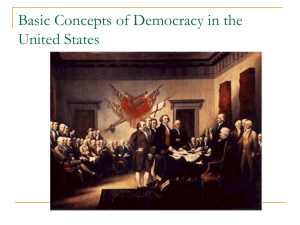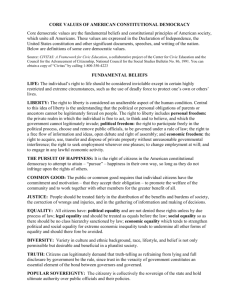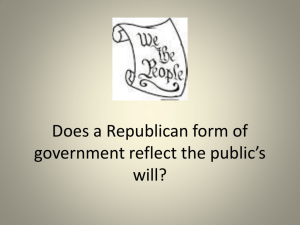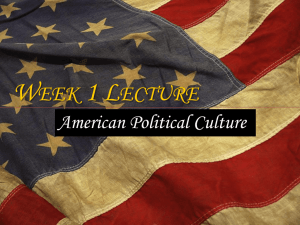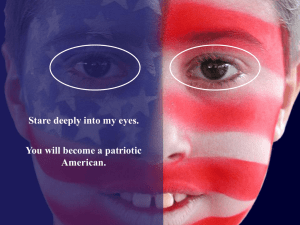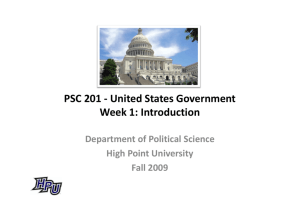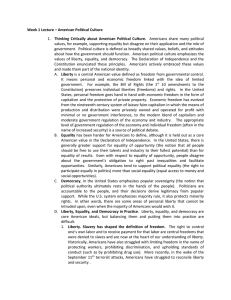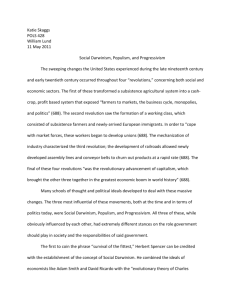Chapter 1 - De Anza College
advertisement
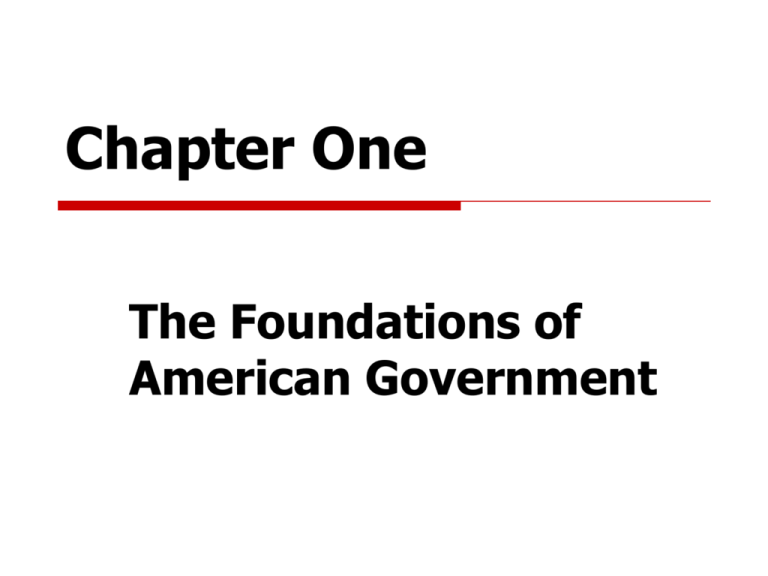
Chapter One The Foundations of American Government What is Politics? Process of resolving conflicts and deciding, as Harold Laswell put it, “who gets what, when, and how” Struggle over power or influence within organizations or informal groups that can grant or withhold benefits or privileges Process that regulates conflict within society (conflict is universal, endemic, pervasive) over the distribution of benefits David Easton = politics is about the authoritative allocation of values for a society What is Government? An institution in which decisions are made that resolve conflicts or allocate benefits and privileges Preeminent institution within society; ultimate authority for making decisions and allocating values Power to enforce rules that impose order and stability; authority to make and enforce laws considered legitimate (proper, appropriate) Max Weber = the state (i.e., government) has a monopoly on the legitimate use of violence Why Do We Need Government? Security Order Liberty, Equality, Property Men/women are not angels Resources are limited, scarce Conflict is endemic, universal All states seek stability, security, prosperity Types of Government Totalitarian regime – rule by a small group or an individual dictator; with control over all aspects of life Authoritarianism – only the government (not social and economic institutions) are fully controlled by the ruler Oligarchy – rule by a few elites, who make decisions to benefit their own group Aristocracy – initially rule by the best suited, which meant the wealthy, later it meant titled nobility Democracy – political power is vested in the people Direct democracy – when citizens vote directly on laws (e.g., initiatives, referendums, recall) Aristotle’s Classification Tyranny Monarchy Oligarchy Aristocracy Democracy Polity Discussion Question What are the advantages and disadvantages of direct democracy? Formal Characteristics of American Democracy Consent of the governed Republican (sovereignty rests in the people) Representative (people elect decisionmakers) Limited government (constitutionalism) Universal suffrage Majority rule/minority protections What Kind of Democracy Do We Have? Majoritarianism – the political theory that, in a democracy, the government should do what the majority of the people want Elite theory – the idea that society is ruled by a small group who exercise power in their selfinterest (class theory = dominant class) Pluralism – a theory that views politics as conflict among interest groups, where decisions are made through bargaining and compromise Discussion Question What kind of democracy do you think we we have? majoritarian? elite? pluralistic? What are the strengths/weaknesses of each theory? What kind of democracy should we have? How “democratic” is the U.S.? What is Political Culture? Collection of beliefs and attitudes toward government and the political process held by a community or nation Learned through political socialization Occurs in many settings, family, schools, etc. Dominant culture = values, customs, and language established by group or groups that have controlled politics and government Subcultures = competing sets of values Fundamental Values of American Political Culture Liberty, equality, and property Liberty = greatest freedom of individuals consistent with freedom of others Equality = all people are of equal worth (formal/legal equality and equal opportunity vs. equality of conditions) Property = anything that is or may be subject to ownership Inherent trade-offs, tension between these values Liberty in tension with equality; equality with property (also liberty with order) Discussion Questions How is liberty in tension with equality? How is liberty in tension with order? What is Ideology? Ideology = comprehensive set of beliefs about the nature of people (human nature) and the role of government Liberalism = advocates government action to improve the welfare of individuals, support for civil rights and tolerance for social change Conservatism = advocates a limited role for the government in helping individuals and support for traditional values and lifestyles Most Americans tend to be moderate Table 1-1: The Traditional Political Spectrum Socialism Liberalism Conservatism Libertarianism How much power should government have over the economy? Active government control of major economic sectors. Positive government action in the economy. Positive government action to support capitalism. Almost no regulation of the economy. What should government promote? Economic equality, community. Economic security, equal opportunity, social liberty. Economic liberty, morality, social order. Total economic and social liberty. What this spectrum leaves out From left to right Communism Democratic Socialism Fascism On a line, or in a circle Figure 1-1: A Four-Cornered Ideological Grid Discussion Question How would you identify yourself? What is your ideological orientation? Hot Links to Selected Internet Resources: Book’s Companion Site: http://politicalscience.wadsworth.com/schmidtbrie f2004 Wadsworth’s Political Science Site: http://politicalscience.wadsworth.com Government Resources on the Web: http://www.lib.umich.edu/govdocs/govweb.html Institute for Philosophy and Public Policy: http://www.puaf.umd.edu/IPPP

